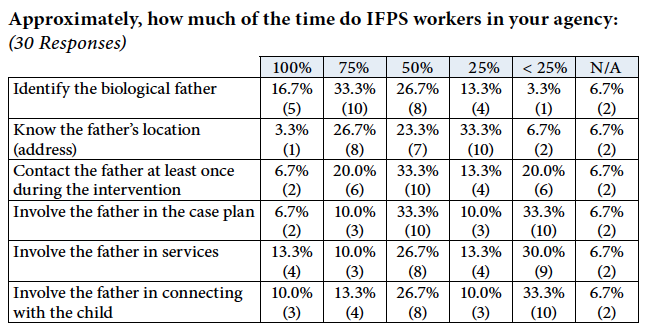It seems that when working with families, especially with those who are not in contact with the fathers of their children, counselors tend to be quiet about bringing up the idea of father involvement. No one really knows the reason why this happens; but one can assume that fathers are not often thought about because they may not be playing a role in the lives of their children. Most of the time the men are either working or are not around. Sometimes they are living apart from the children because of past conflict with the mother. Mothers seem to be more of the caretaker who provides for the ongoing basic needs of their children, no matter what.
A recent survey of the extent to which IFPS providers involve fathers revealed the following:
If fathers are given the opportunity and are encouraged to be part of the intervention, the children’s behavior may improve and they would experience a positive change in their family dynamics. If fathers were to be interviewed, many of them would probably say that they want to play an active role in the lives of their children. With fathers involved, a stronger parental bond can be established between the parents and with the children, which can help to influence positive changes within the family.
According to the Fatherhood Institute website dated December 15, 2010, “children of involved fathers are more likely to live in cognitively stimulating homes (Williams & Sternberg, 2002) and fathers’ commitment to the education process also matters.” If a teenager is having issues with being destructive at home, would it not be a good idea to include every member of the family, since the problem not only affects one person, but everyone within the family? This would give the families the opportunity to work together and build on change. So the question is asked again, why not include fathers in the intervention process?
According to the Social Work Dictionary (5th Edition), family therapy “focuses on the whole system of individuals and interpersonal and communication patterns. It seeks to clarify roles and reciprocal obligations and to encourage more adaptable behaviors among the family members.” If we believe in the family system, why is it that fathers are not included in the intervention process? After all, is it not our goal as counselors to have the family work together in order to decrease the extremity of unhealthy behaviors? Fathers can become a supportive beam to the structure of the household that will help to stabilize the foundation of the family. When the entire family is part of the intervention, we see greater progress and stability within the family.
To engage fathers, perhaps we can consider the following questions when interviewing the mothers:
- Do you have any safety concerns that keep you from wanting your children to have more contact with their father?
- How can you reach out to the child(ren)’s father?
- What relationship does the child(ren) have with their father?
- How often does the child(ren) see their father?
- What type of influences might the father have on the children?
- It seems that if we involve the father in the intervention, the child may begin to work on some positive changes. What do you think?
Of course one is aware that not every child may have the opportunity to have a father around due to possible safety issues or the nature of different circumstances. Nevertheless, we can begin to empower those fathers who are around and want to take an active role in their children’s lives.
As professionals, it is important that we work closely together to come up with different strategies on how to engage fathers and help them to be part of their children’s lives. If this happens, we will begin to see positive results.
For more information on IFPS and father involvement, see the IFPS Guide to Father Involvement.
Please feel free to comment and share your thoughts.
_______________
Posted by Moneefah D. Jackson

